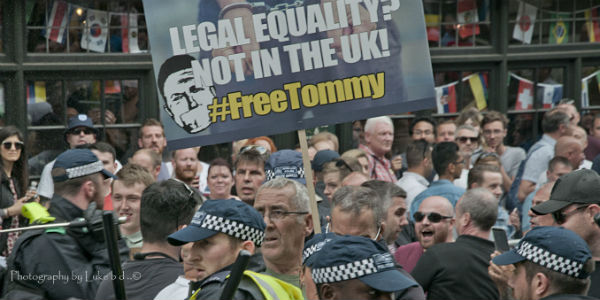Tommy Robinson and the UK’s post-EDL far right: how extremists are mobilising in response to online restrictions and developing a new ‘victimisation’ narrative
After protests in London following the imprisonment of far-right activist Tommy Robinson, William Allchorn examines the changing strategies of the UK’s fringe extreme-right groups in recent months, which include a concerning revival of street protest, mobilising around a narrative of victimisation.
 Protesters in support of Tommy Robinson, London, 9 June, 2018. Picture Luke B, via a (CC BY-NC 2.0) licence
Protesters in support of Tommy Robinson, London, 9 June, 2018. Picture Luke B, via a (CC BY-NC 2.0) licence
Last weekend (9 June), saw one of the most prominent far-right mobilisations of the year. Assembling in Trafalgar Square, hundreds of demonstrators turned out to protest the arrest and imprisonment of former English Defence League (EDL) leader, Tommy Robinson (real name Stephen Christopher Yaxley Lennon), for contempt of court after he broadcast live outside a rape trial in Leeds. Such has been the prominence of his arrest that anti-Islam campaigner and leader of the Dutch Party for Freedom, Geert Wilders, spoke at Saturday’s demonstration. Meanwhile, Donald Trump’s son, Donald Junior, lent his support – tweeting: ‘Reason #1776 for the original #brexit’. Moreover, and after a UK parliamentary e-petition was rejected, a Change.org petition – asking supporters to ‘stand together, stand strong, and stand by [Robinson’s] side’ – has accrued over 600,000 signatures, demonstrating the rallying and unifying effect Robinson still possesses nearly five years after leaving the anti-Islam protest movement EDL.
Since Robinson’s departure from the EDL in 2013, however, the UK far right has changed significantly. Several groups, including Britain First, National Action (alleged members of which are currently on trial for plotting to murder a West Lancashire MP) and the Football Lads Alliance, have taken the EDL’s place but have rarely been able to reach the size the EDL achieved at its peak, both in terms of protest numbers and sustained media attention. Moreover, the use of social media and the internet has become a much more prominent part of the UK far right’s political playbook – with group’s like Britain First using Facebook and sites like LiveLeak to broadcast protests, ‘Christian patrols’, and ‘mosque invasions’ online to thousands of viewers across the world. Since the EDL, the emphasis, therefore, has been less on mass protest and more on how many followers, ‘likes’ and retweets a particular group receives.
Whilst this is to a large extent still true, with such groups remaining trivial in terms of electoral relevance and popularity, events in the past few months have led the UK far right back onto the streets – deploying a more traditional style of ‘march and grow’ politics reminiscent of the 1970s-era National Front. In March 2018, Britain First and its leaders were banned from Facebook for ‘repeatedly post[ing] content designed to incite animosity and hatred against minority groups’. This came as part of a wider crackdown by social media platforms – with Tommy Robinson and Britain First Twitter accounts suspended last year under new rules concerning inappropriate content and behaviour. Such bans haven’t been 100 percent watertight, however. Tommy Robinson’s official Facebook page still has nearly 890,000 followers and continues to sell his merchandise and message.
Another factor in this shift has been the rise of demonstrations by the anti-Muslim football hooligan protest collective, the Football Lads Alliance (FLA) and Democratic Football Lads Alliance (DFLA), as well as the pan-European ethno-nationalist movement, Generation Identity (GI), who believe that (mainly Muslim) migration into Europe is leading to a ‘great replacement’ of indigenous white citizens. In March 2018, for example, an estimated 5000 FLA and DFLA demonstrators descended on Birmingham in a sign of unity by ‘the football family against [Islamic] extremism’. Moreover, in May 2018, 2000–3000 far-right protestors – mainly composed of DFLA supporters – rallied at Speaker’s Corner in Hyde Park in a ‘March for Freedom’. Speaking alongside other alt-right vloggers, Tommy Robinson said: ‘The people of this country have been silenced for 20–30 years with the tag of racists…They now realise that that tag is dead: no one cares anymore with being labelled racists.’ Finally, in March again, 1000 protestors assembled in Hyde Park – this time under the auspices of GI – in the name of free speech.
The common thread running through these recent returns to mass street protests can be attributed to online crackdowns, but can also be directly linked to the role of Tommy Robinson in rallying and unifying the UK far right. After a failed attempt to create a UK chapter of the German anti-Islam protest group, Pegida, in early 2016, Robinson has remained a largely obscure character on the UK far-right scene – restyling himself as an alt-right ‘journalist’ and working for the Canadian far-right political and social commentary website, Rebel Media. After the suspension of his Twitter account and his exit from Rebel Media in February 2018, Robinson has, however, returned to his role as a key organiser within the UK far right – joining up with the DFLA and Generation Identity at their most recent protests to provide organisational and logistical support. Moreover, he has also been able to lend his intellectual weight to recent protests – with arguments about a police state and two-tier justice system key themes in his 2015 part-essay, part-autobiography, Enemy of the State. Finally, and in relation to Robinson’s recent imprisonment, the UK far-right scene now has a human representation of their main victimisation narrative. As Alexander Oaten argues in a 2014 research article on the EDL, collective victimhood helps to galvanise a movement around its core aims and goals, and helps to identify clear antagonistic Others (such as Islam and the State) to fight against. It was no surprise that Geert Wilders’ speech at the recent protest tried to tap into this, with him stating: ‘I am here to tell you that you will never walk alone. And we are here to tell the world, and the UK government in particular: “Free Tommy Robinson!”’.
In sum, then, whilst it might be too far-fetched to say that Robinson is the de-facto leader of the UK far right, his recent return to prominence is symbolic of a wider shift away from internet-based activism and back onto the UK’s streets. As far-right parties continue to struggle electorally, street protest has become the main form of activity for a new array of post-EDL groups to make claims about migration, so-called ‘Islamic extremism’ and anti-establishment concerns regarding claims on restrictions to freedom of speech. How long this nascent trend will last without the help of a key organiser, like Robinson, who is now serving a 13-month sentence, having pled guilty to the contempt of court charge, is difficult to predict. What is, however, demonstrated by this recent episode is the power of collective victimisation in amplifying the UK contemporary far right’s indignation and discontents – both within the UK and abroad.
This article gives the views of the author, not the position of Democratic Audit.
About the author
 Dr William Allchorn is a specialist on anti-Islam protest movements and radical right social movements in the UK and Western Europe. His PhD thesis mapped political, policing and local authority responses to the anti-Islam, English Defence League, in five UK locations. As of April 2018, he is the Associate Director of the Centre for the Analysis of the Radical Right (CARR).
Dr William Allchorn is a specialist on anti-Islam protest movements and radical right social movements in the UK and Western Europe. His PhD thesis mapped political, policing and local authority responses to the anti-Islam, English Defence League, in five UK locations. As of April 2018, he is the Associate Director of the Centre for the Analysis of the Radical Right (CARR).





 Democratic Audit's core funding is provided by the Joseph Rowntree Charitable Trust. Additional funding is provided by the London School of Economics.
Democratic Audit's core funding is provided by the Joseph Rowntree Charitable Trust. Additional funding is provided by the London School of Economics.
Thanks to social media nobody has to rely on these lying media outlets to find out the truth about something. There were TENS OF THOUSANDS of people at the protest and they were people of all different races and religions. I saw a black woman holding a “Free Tommy” sign next to someone holding a “white lives matter” banner! You cowards in the MSM can only lie to the people for so long untill the people wake up and realise they are being fed pure propagandera straight from the highest reach of this treacherous government. If Tommy comes to harm in prison we will bring this country to an absolute standstill! He represents all of us patriots who love this country and want a safe secure future for our children, no matter what colour we are.
As per usual false report !! there was thousands there saturday!!
Report the truth instead of the lies you print.
What are you afraid of????
We the people are rising,we will have our say,we will be heard and you reporting lies will never stop us
First paragraph “hundreds of demonstrators”
Fake news.
I’m not even going to read the rest of the article if you can’t or don’t know the difference between “hundreds” and “thousands” Of you are willingly lieing to people.
What nonsense there was tens of thousands on the March Saturday. I know because I was there. You seem to want to label everyone a racist who has a problem with all religions. This occult is bad for everyone who don’t follow it.
I believe that far-right groups are being ‘victimized’ because whenever they express their thoughts on contentious issues such as mass immigration and the rapid Islamization of Britain, they are immediately muzzled and forced into an ever increasingly tight corner by the media and the government.
Expressing concerns about such issues is not ‘racist’ because the definition of a racist is ”a person who shows or feels discrimination or prejudice against people of other races, or who believes that a particular race is superior to another.”
It is a proven fact that there is a growing number of Islamic fundamentalists who are trying to establish sharia law in the UK.
Notable figures such as Anjem Choudary and Simon Keeler are known for their extremist views and desires which present a genuine threat to law-abiding British citizens.
The EDL clearly lack faith in the Government’s strategy to tackle UK Islamic extremism and chose to tackle it their own way.
The government clearly doesn’t agree with the EDL’s strategy because they believe that tackling it head-on by means of marches (which more often than not descend into violent clashes between EDL supporters and those who oppose them.)
So what is the EDL supposed to do?
Stand back and watch the country of their birth change into a place where supporters of Islam extremists grow and spread their ideology and threaten the peace and security of law-abiding citizens?
The recent imprisonment of Tommy Robinson will only serve to antagonize far-right groups and convince them that Britain is being turned into an Islamic state in which their supporters are protected by the state whereas EDL supporters rights are being denied.
EDL supporters see that as a betrayal and as a consequence they lose faith in British democracy and turn to people and groups that share their thoughts and feelings which leads to more restrictions from the government and in the end all you get is a Dystopian society in which everyone sees each other as a threat.
What is the solution to this sad situation?
Accuse far-right groups of being ‘cry babies’ because they can’t get their own way while the genuine threat posed by extremist Islamists continues to grow?